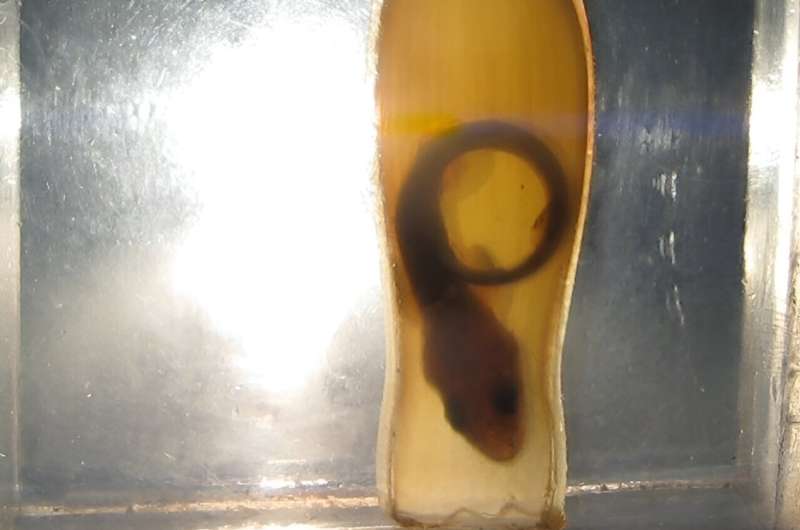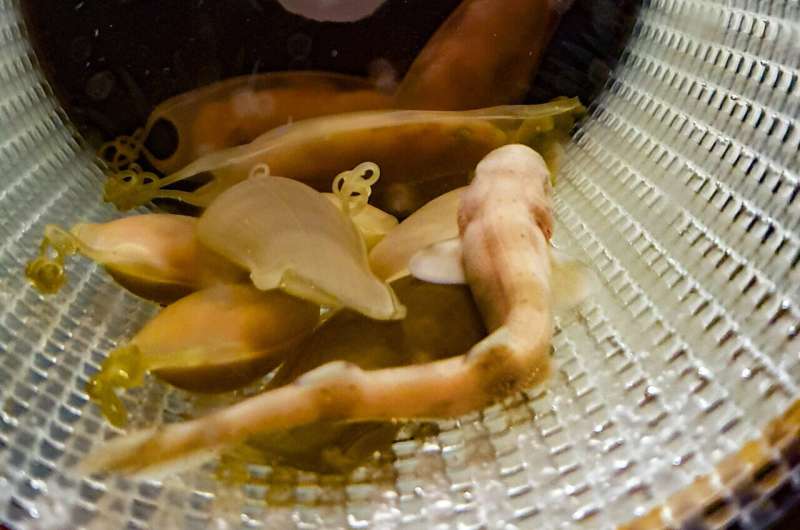This article has been reviewed according to Science X's editorial process and policies. Editors have highlighted the following attributes while ensuring the content's credibility:
fact-checked
trusted source
proofread
Shark hatching success drops from 82% to 11% in climate change scenario

New experimental research shows that the combined effects of ocean warming and acidification could lead to a catastrophic decrease in embryonic shark survival by the year 2100. This research is also the first to demonstrate that monthly temperature variation plays a prominent role in shark embryo mortality.
Oceanic warming and acidification are caused by greater concentrations of CO2 dissolving into marine environments, resulting in rising water temperatures and falling pH levels.
"The embryos of egg-laying species are especially sensitive to environmental conditions," says Noémie Coulon, a Ph.D. student at the Laboratoire de Biologie des Organismes et des Écosystèmes Aquatiques, France. "The hatching success of embryos is a crucial factor for population dynamics. In the case of skates and sharks, which have a slow pace of life, low hatching rates could be critical for population renewal."
Small-spotted catsharks (Scyliorhinus canicula) are one of the most abundant shark species in Europe.
"The small-spotted catshark is already experiencing habitat loss in coastal areas, particularly during the summer months when egg-laying is at its peak," says Coulon.
Coulon and her team compared small-spotted catshark embryo survival in three environmental scenarios: one control scenario using baseline temperature and pH data from the years 1995 to 2014, and two using predicted climate scenarios for the year 2100 called the Shared Socioeconomic Pathways (SSPs) as outlined in the United Nations' Intergovernmental Panel on Climate Change's Sixth Assessment Report released in 2021.
SSP2, known as the "Middle of the Road" scenario, represents a future where slow and non-uniform progress towards tackling climate change is present but net-zero is not reached, and predicts a temperature rise of 2.7°C and drop in pH of 0.2 by the year 2100.
SSP5, known as the "Fossil-fueled Development" scenario, represents a future where fossil fuel resources continue to be more rapidly exploited across the world, and predicts a temperature rise of 4.4°C and drop in pH of 0.4 by the year 2100.
To assess the impact of these different scenarios, Coulon and her team measured embryo growth and yolk consumption within small-spotted catshark eggs every week over a 4-month period, while recording hatching success and growth of surviving baby sharks for 6 months post-hatching.
While the team found a high survival rate for both the control and SSP2 scenarios (81% and 83% respectively), there was a much lower chance of survival for the SSP5 scenario. "We were shocked by the low survival rate observed in the SSP5 scenario, with only 11% of embryos hatching," says Coulon. The team indicated that the mortality was linked with lower yolk consumption rates, lower growth rates and failure to transition to internal gills.
This research also highlights the importance of seasonal temperature variation, which can significantly increase mortality during critical egg laying periods. "This mortality was most pronounced in August, coinciding with the highest temperatures (reaching 23.1°C), and during a stage of development where embryos undergo gill reabsorption," explains Coulon.

Coulon and her team noticed that the surviving 11% did not exhibit the typical growth pattern of the other sharks, which may have contributed to their resistance to environmental change: "What makes these individuals special remains unclear, but by acknowledging the inter-individual variation among young marine organisms, we could better evaluate the future ecological success of species."
This research offers both a serious caution and a beacon of hope for marine species.
"Firstly, it serves as a warning about the responses of other species that may be even more sensitive to environmental change," explains Coulon. "Secondly, our findings demonstrate that the more moderate SSP2 scenario can limit the damage inflicted on species like the small-spotted catshark, which gives us a positive incentive to reduce our greenhouse gas emissions."
This research is being presented at the Society for Experimental Biology Annual Conference in Prague from 2–5 July 2024.
Provided by Society for Experimental Biology



















